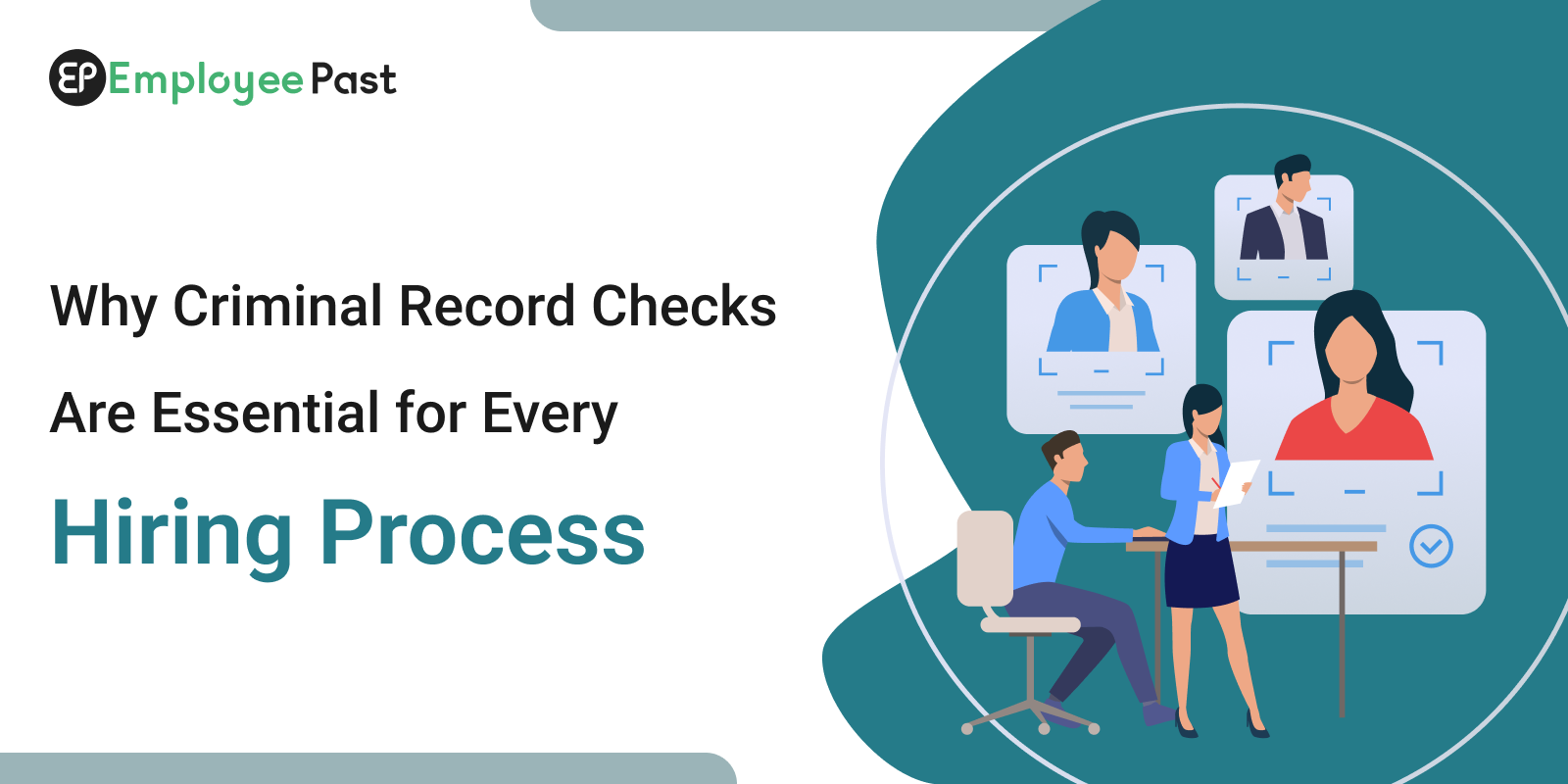- Apr 30, 2025
- Updates
- 1668
Share this post on:

Hiring the right candidate is one of the most critical decisions a business can make. A single misstep in the hiring process can lead to financial losses, damaged reputations, and workplace safety concerns. One of the most effective ways to mitigate these risks is by incorporating criminal record checks into every hiring process. These checks provide employers with vital information about a candidate’s background, ensuring safer workplaces, protecting company assets, and maintaining trust with clients and employees. In this article, we’ll explore why criminal record checks are indispensable and how they contribute to a robust hiring strategy.
Ensuring Workplace Safety
The safety of employees, clients, and visitors is a top priority for any organization. A criminal record check helps employers identify candidates with histories of violent behavior, theft, or other serious offenses that could pose a risk in the workplace. For example, hiring someone with a history of assault for a role that involves close interaction with colleagues or customers could lead to dangerous situations. By conducting thorough background screenings, employers can make informed decisions and reduce the likelihood of workplace incidents.
Workplace safety isn’t just about physical security—it also encompasses creating an environment where employees feel secure. Knowing that their employer takes background checks seriously fosters trust and confidence among staff. This, in turn, boosts morale and productivity, as employees can focus on their work without worrying about potential threats from coworkers with undisclosed criminal histories.
Protecting Company Reputation
A company’s reputation is one of its most valuable assets. Hiring an individual with a criminal background, particularly for roles involving sensitive responsibilities, can jeopardize that reputation. For instance, if a financial advisor with a history of fraud is hired, their actions could lead to client losses and negative publicity, tarnishing the company’s image. Criminal record checks act as a safeguard, helping employers avoid such scenarios by identifying red flags before a candidate is onboarded.
In industries like healthcare, education, or childcare, where trust is paramount, the stakes are even higher. A single incident involving an employee with a criminal past can erode public confidence and lead to long-term damage. By prioritizing criminal record checks, businesses demonstrate their commitment to integrity and accountability, reinforcing their reputation as responsible and trustworthy organizations.
Mitigating Financial Risks
Hiring an employee with a criminal history can expose a company to significant financial risks. For example, individuals with records of theft or embezzlement may be more likely to engage in fraudulent activities, leading to monetary losses. In some cases, employers may also face lawsuits or penalties if an employee’s actions harm clients, coworkers, or the public. These incidents can result in costly legal battles, settlements, and increased insurance premiums.
Criminal record checks help employers identify candidates who may pose such risks, allowing them to make safer hiring decisions. By investing in background screenings, businesses can avoid the far greater costs associated with workplace misconduct, litigation, and damage control. This proactive approach not only protects the company’s bottom line but also ensures resources are allocated to growth rather than crisis management.
Meeting Legal and Regulatory Requirements
In many industries, criminal record checks are not just a best practice—they’re a legal requirement. Sectors such as finance, healthcare, and transportation often have strict regulations mandating background screenings to ensure compliance with industry standards. Failing to conduct these checks can result in hefty fines, loss of licenses, or other regulatory consequences.
Even in industries without specific mandates, employers have a legal duty to provide a safe working environment. Negligent hiring lawsuits, where an employer is held liable for harm caused by an employee with a known criminal history, are a growing concern. By incorporating criminal record checks into the hiring process, businesses can demonstrate due diligence and reduce their exposure to legal liabilities.
Enhancing Hiring Accuracy
Criminal record checks provide employers with a more complete picture of a candidate’s suitability for a role. Resumes and interviews can showcase a candidate’s skills and charisma, but they may not reveal critical details about their past. A background check fills in these gaps, offering objective data that complements other aspects of the hiring process.
For example, a candidate applying for a role that requires handling sensitive information may appear qualified on paper. However, a criminal record check might reveal a history of data theft, prompting the employer to reconsider their decision. By combining criminal record checks with reference checks, skills assessments, and interviews, employers can make more informed and accurate hiring decisions.
Building Client and Stakeholder Trust
Clients and stakeholders expect businesses to operate with transparency and accountability. Hiring employees with undisclosed criminal histories can undermine this trust, especially in roles that involve direct client interaction or access to confidential information. Criminal record checks demonstrate a company’s commitment to vetting its workforce thoroughly, reassuring clients that their interests are protected.
In industries like retail or hospitality, where employees interact with customers daily, trust is a key differentiator. A background screening process that includes criminal record checks signals to clients that the business prioritizes their safety and security. This can lead to stronger client relationships, repeat business, and positive word-of-mouth referrals.
Streamlining the Hiring Process
Modern background screening solutions have made criminal record checks faster and more efficient than ever. With advanced technology, employers can access comprehensive reports in a matter of days, allowing them to maintain a streamlined hiring process without sacrificing thoroughness. These solutions often integrate with applicant tracking systems, making it easy to manage candidate data and ensure compliance with data protection regulations.
By partnering with a reputable background screening provider, businesses can customize their checks to suit specific roles or industries. For example, a criminal record check for a warehouse worker might focus on theft-related offenses, while a check for a childcare worker might prioritize offenses involving minors. This tailored approach ensures that employers receive relevant insights without unnecessary delays.
Adapting to a Changing Workforce
The rise of remote work, gig economies, and global hiring has added complexity to the recruitment process. Employers are now vetting candidates from diverse geographic locations, often with limited in-person interaction. Criminal record checks provide a standardized way to assess candidates, regardless of where they’re located, ensuring consistency and fairness in the hiring process.
Additionally, as businesses expand into new markets, they may encounter varying legal and cultural expectations around background screenings. A reliable criminal record check process helps employers navigate these complexities, ensuring compliance with local regulations while maintaining a high standard of due diligence.
Conclusion
Criminal record checks are a non-negotiable component of a responsible hiring process. They protect workplaces, safeguard reputations, mitigate financial risks, and ensure compliance with legal standards. By incorporating these checks, employers can make informed decisions, build trust with stakeholders, and create a safer, more productive work environment. As the hiring landscape continues to evolve, businesses must prioritize robust background screening to stay ahead of risks and maintain their competitive edge. EmployeePast is one of the leading background screening solution providers, offering comprehensive and efficient tools to help employers integrate criminal record checks seamlessly into their hiring strategies.










